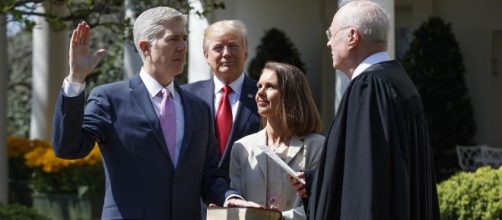With Monday’s swearing in ceremony the United States ended the longest period of a short staffed Supreme Court since the Civil War. The confirmation made history in many ways but at least it now gives the Senate to concentrate on other issues that will be of more importance than the highest court in the land.
Vacancy
When Justice Antonin Scalia died on February 13th 2016, nobody thought that his replacement would not be confirmed until more than a year later.
With the excuse of the upcoming presidential election, the Republican majority in the Senate refused to even consider Merrick Garland, President Barack Obama’s nomination for the court vacancy.
The obvious Republican plan was to ensure that Scalia’s replacement would also follow his conservative beliefs in the position. This created the conditions for one of the most contested confirmation hearings in history.
The Democrats tried to use their numbers to force a filibuster to delay the inevitable appointment of Gorsuch, but last week the Republicans changed the Senate rules to allow for confirmation on a simple majority and on Friday Neil Gorsuch was confirmed as the newest Justice of the Supreme Court of the United States.
Acrimony
Now that this battle is over, the Senate must leave behind the acrimony of these last few weeks and the anger at what the Democrats still see as a “stolen” seat on the Supreme Court and seek to establish a working relationship on what is sure to be another controversial and unpredictable term leading up to next year’s midterms.
On the table for consideration by the senators will be many contested pieces of legislation including the proposal to build the border wall with Mexico, the increased spending for the military and the proposed budget which will see many cuts in important areas such as the State Department and in many services to the population.
In addition, there is still the possibility that President #Donald Trump will once more attempt to draft repeal and replace the Affordable Care Act after Republican House Leader Paul Ryan pulled his bill rather than face its inevitable defeat in Congress.
What makes these items of importance is the fact that the proposals from the White House do not have the backing of many Republicans, either for budgetary reasons or for philosophical reasons as we saw in Congress where the Republican Freedom Caucus played a fundamental role in the defeat of the ACA replacement bill.
One vote
Making the situation even more delicate is the single vote majority held by the Republicans in the Senate. This effectively means that the GOP will need to work together with the Democrats to ensure passage of contested pieces of legislation.
This may well be possible as the Senate Intelligence Committee has provided proof that Republicans and Democrats are capable of working together on important issues as they proceed on the committee’s investigation of the alleged Russian interference of last year’s presidential election.
Sword
In fact, the investigations into the alleged collusion of members of the Trump team with Russian agents now under investigation by both Houses and the intelligence community is the sword of Damocles hanging over the White House and both Houses of the Legislative Branch.
Without pre-empting the outcome of the investigations, the results of these investigations have the potential of seriously destabilizing the Oval Office and thus both the Republicans and the Democrats will have the responsibility of helping the country overcome any possible constitutional crisis that may arise.
Now that Neil Gorsuch is about to sit on the Supreme Court bench for the first time, the Senate must now forget the battle and prepare for the future battles that now face it in the Chamber.
The challenges facing the senators in the near future will test both Republicans and Democrats and they cannot carry out their tasks properly if they continue the recent acrimony. The good government of the United States is at stake.

